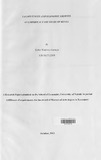| dc.description.abstract | The relationship between economic growth and tax revenues is a debate that has existed for a long time in the living history. The discussion on the two variables has exhibit contentions from academicians and policy makers with one school holding on the view that taxation is bad for the economy while the other school believe that taxation is good for the economy. Valuable empirical literature exists that studies the relationship between economic growth and tax revenues though most of them analyze the variable at cross-country level. However, not much literature exists exploring the relationship between the two variables at country specific level.
The object in this study was thus to fill in the literature gap in country specific studies by exploring the relationship between economic growth and tax revenues in Kenya, and also determining causation between the variables. Three approaches were utilized to accomplish the study objective. The first method involved a c1assical linear regression model based on the OLS estimation method. The second method used co integration test while the third method involved performing a granger causality test on all the variables.
The results of the study revealed a positive relationship between economic growth and tax revenues. All the tax variables; income tax, import duties, excise duties and sales tax/VAT showed a positive effect on GDP with income tax posing the highest effect followed by sale tax/VA T, then excise duties and finally import duties showing the least effect. The cointegration revealed that there is at most one co integrating equation while the Granger Causality test indicated a bi-directional relationship between economic growth and excise duties; a unidirectional relationship between income tax and economic growth, and economic growth and sales tax VAT; however, there existed no causation between economic growth and import duties.
These results suggest that the government should desist from concentrating on increasing tax revenues by increasing tax levels but instead employ a tax structure that enhances the tax base thus improving growth rate. In addition, the government should utilize the positive relationship between tax and economic growth to realize efficient government investment expenditure that spars growth in turn boosting the revenue levels. Finally, the government should particularly target income taxes, sales tax/VAT and excise taxes for its revenues by improving the tax collection system, eliminating fraud, evasion and corruption. | en_US |

